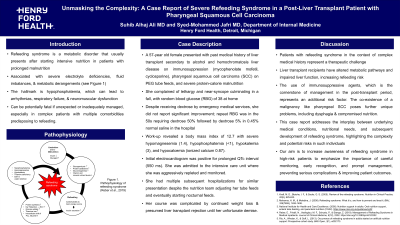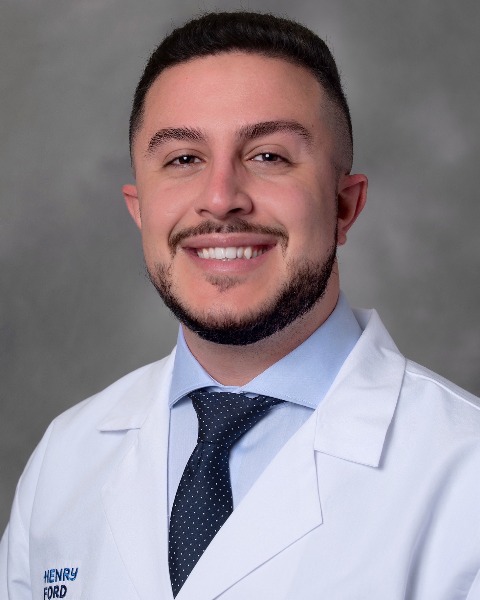Sunday Poster Session
Category: Liver
P1123 - Unmasking the Complexity: A Case Report of Severe Refeeding Syndrome in a Post-Liver Transplant Patient With Pharyngeal Squamous Cell Carcinoma
Sunday, October 22, 2023
3:30 PM - 7:00 PM PT
Location: Exhibit Hall

Has Audio

Suhaib Alhaj Ali, MD
Henry Ford Hospital
Detroit, MI
Presenting Author(s)
Suhaib Alhaj Ali, MD1, Syed-Mohammed Jafri, MD2
1Henry Ford Hospital, Detroit, MI; 2Henry Ford Health System, Detroit, MI
Introduction: Refeeding syndrome is a metabolic disorder that usually presents after starting intensive nutrition in malnourished patients. It is associated with severe electrolyte deficiencies, fluid imbalances, and metabolic derangements. It can be potentially fatal if unexpected or inadequately managed, especially in complex patients with multiple comorbidities.
Case Description/Methods: A 57-year old female presented with past medical history of liver transplant secondary to alcohol and hemochromatosis liver disease on immunosuppression (mycophenolate mofetil, cyclosporine), pharyngeal squamous cell carcinoma (SCC) on PEG tube feeds, and severe protein-calorie malnutrition. She complained of lethargy and near-syncope culminating in a fall, with random blood glucose (RBG) of 38 at home. Despite receiving dextrose by emergency medical services, she did not report significant improvement; repeat RBG was in the 50s requiring dextrose 50% followed by dextrose 5% in 0.45% normal saline in the hospital. Work-up revealed a body mass index of 12.7 with severe hypomagnesemia (1.4), hypophosphatemia (< 1), hypokalemia (3), and hypocalcemia (ionized calcium 0.87). Initial electrocardiogram was positive for prolonged QTc interval (550 ms). She was admitted to the intensive care unit where she was aggressively repleted and monitored. She had multiple subsequent hospitalizations for similar presentation despite the nutrition team adjusting her tube feeds and eventually starting nocturnal feeds. Unfortunately, her course was complicated by continued weight loss and presumed rejection of her transplanted liver until her unfortunate demise.
Discussion: Patients with refeeding syndrome in the context of complex medical history, including organ transplant and malignancy, represent a therapeutic challenge. Liver transplant recipients have altered metabolic pathways and impaired liver function, increasing refeeding risk. The co-existence of a malignancy like pharyngeal SCC poses further unique problems, including dysphagia and compromised nutrition. This case report addresses the interplay between underlying medical conditions, nutritional needs, and subsequent development of refeeding syndrome, highlighting the complexity and potential risks in such individuals. Our aim is to increase awareness and understanding of refeeding syndrome in high-risk patients to emphasize the importance of careful monitoring, early recognition, and prompt management. This will help prevent serious complications and improve patient outcomes.
Disclosures:
Suhaib Alhaj Ali, MD1, Syed-Mohammed Jafri, MD2. P1123 - Unmasking the Complexity: A Case Report of Severe Refeeding Syndrome in a Post-Liver Transplant Patient With Pharyngeal Squamous Cell Carcinoma, ACG 2023 Annual Scientific Meeting Abstracts. Vancouver, BC, Canada: American College of Gastroenterology.
1Henry Ford Hospital, Detroit, MI; 2Henry Ford Health System, Detroit, MI
Introduction: Refeeding syndrome is a metabolic disorder that usually presents after starting intensive nutrition in malnourished patients. It is associated with severe electrolyte deficiencies, fluid imbalances, and metabolic derangements. It can be potentially fatal if unexpected or inadequately managed, especially in complex patients with multiple comorbidities.
Case Description/Methods: A 57-year old female presented with past medical history of liver transplant secondary to alcohol and hemochromatosis liver disease on immunosuppression (mycophenolate mofetil, cyclosporine), pharyngeal squamous cell carcinoma (SCC) on PEG tube feeds, and severe protein-calorie malnutrition. She complained of lethargy and near-syncope culminating in a fall, with random blood glucose (RBG) of 38 at home. Despite receiving dextrose by emergency medical services, she did not report significant improvement; repeat RBG was in the 50s requiring dextrose 50% followed by dextrose 5% in 0.45% normal saline in the hospital. Work-up revealed a body mass index of 12.7 with severe hypomagnesemia (1.4), hypophosphatemia (< 1), hypokalemia (3), and hypocalcemia (ionized calcium 0.87). Initial electrocardiogram was positive for prolonged QTc interval (550 ms). She was admitted to the intensive care unit where she was aggressively repleted and monitored. She had multiple subsequent hospitalizations for similar presentation despite the nutrition team adjusting her tube feeds and eventually starting nocturnal feeds. Unfortunately, her course was complicated by continued weight loss and presumed rejection of her transplanted liver until her unfortunate demise.
Discussion: Patients with refeeding syndrome in the context of complex medical history, including organ transplant and malignancy, represent a therapeutic challenge. Liver transplant recipients have altered metabolic pathways and impaired liver function, increasing refeeding risk. The co-existence of a malignancy like pharyngeal SCC poses further unique problems, including dysphagia and compromised nutrition. This case report addresses the interplay between underlying medical conditions, nutritional needs, and subsequent development of refeeding syndrome, highlighting the complexity and potential risks in such individuals. Our aim is to increase awareness and understanding of refeeding syndrome in high-risk patients to emphasize the importance of careful monitoring, early recognition, and prompt management. This will help prevent serious complications and improve patient outcomes.
Disclosures:
Suhaib Alhaj Ali indicated no relevant financial relationships.
Syed-Mohammed Jafri: Gilead, Takeda, Abbvie – Advisor or Review Panel Member, Speakers Bureau.
Suhaib Alhaj Ali, MD1, Syed-Mohammed Jafri, MD2. P1123 - Unmasking the Complexity: A Case Report of Severe Refeeding Syndrome in a Post-Liver Transplant Patient With Pharyngeal Squamous Cell Carcinoma, ACG 2023 Annual Scientific Meeting Abstracts. Vancouver, BC, Canada: American College of Gastroenterology.
